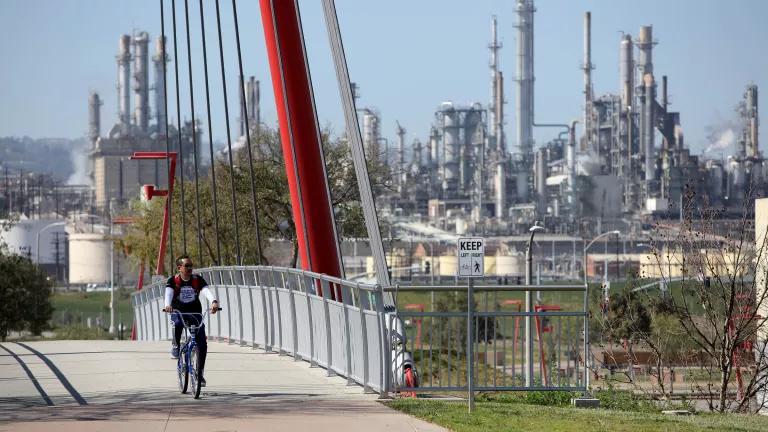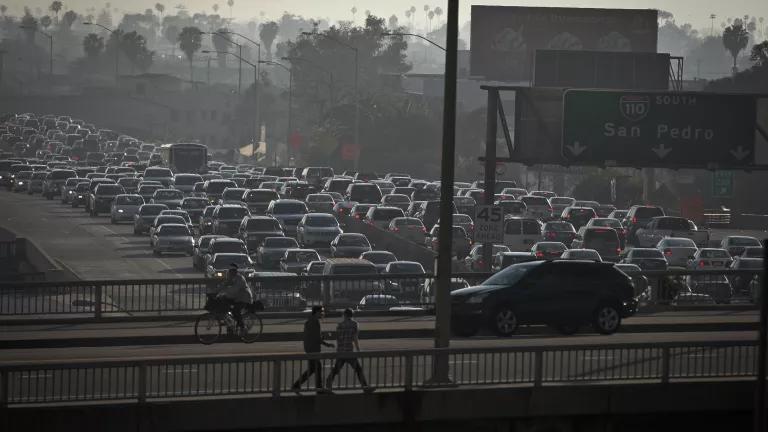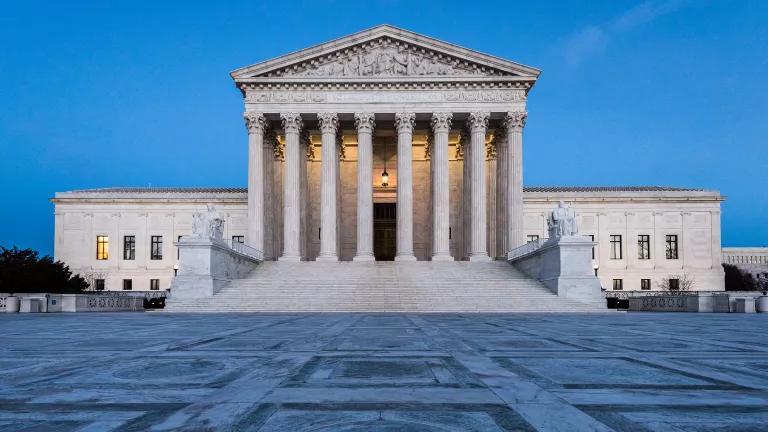NRDC and Partners Sue After EPA Gives Pass to Polluters During Pandemic
The agency’s non-enforcement policy risks pollution spikes in already overburdened communities—making COVID-19 that much more dangerous.

Oil refineries dominate the landscape at Wilmington Waterfront Park near the Port of Los Angeles.
Learn more about NRDC’s response to COVID-19.
The agency’s non-enforcement policy risks pollution spikes in already overburdened communities—making COVID-19 that much more dangerous.
Together with partners, NRDC sued the U.S. Environmental Protection Agency today for ignoring an emergency rulemaking petition filed in response to the EPA’s non-enforcement policy, which would allow industries to stop monitoring and reporting polluting in the midst of the COVID-19 pandemic—with no notice to the public.
“This policy benefits polluters and polluters alone—all at our expense,” says NRDC president Gina McCarthy. “During a pandemic that is hitting people with heart and lung disease the hardest, it is senseless to push forward a ‘don’t ask, don’t tell’ policy for polluters that will allow them to make our air and water dirtier without warning or repercussion.”
Monitoring and reporting are at the core of the EPA’s enforcement of bedrock environmental laws and serve as a critical means of deterring air and water emissions.
The coalition of community-based environmental, climate justice, and public interest groups had demanded that the agency issue an emergency rule requiring companies that take advantage of the policy to publicly disclose in writing when and why they stopped monitoring or reporting their emissions, which then the EPA must immediately disclose to the public. The agency ignored that request. “The EPA’s failure to swiftly issue a rule requiring public notice of which facilities are accepting the agency’s invitation to use the crisis as an opportunity to opt out of compliance with environmental standards is unreasonable and endangers the public,” says Robert Weissman, president of Public Citizen.
The EPA’s move comes as new research shows that long-term exposure to air pollution—which causes disease and weakens the respiratory system’s ability to fight infections—is associated with significantly higher death rates from the coronavirus in the United States.
“For far too long, chemical, oil, and energy companies have been allowed to risk the safety, pollute the air and water, and damage the health and well being of communities of color, Indigenous communities, and low-income communities, who have been subject to these cumulative impacts far more than other communities," says Michele Roberts, national co-coordinator of the Environmental Justice Health Alliance for Chemical Policy Reform. “Now this administration is using a pandemic that is also disproportionately harming our people as an excuse to build on that fundamental injustice and environmental genocide by giving a free pass to polluters.”
The lawsuit asks the court to order the EPA to issue the emergency rule immediately to limit the potentially devastating impacts to already overburdened communities.
“These environmental regulations are in place not just to protect the public,” says José Bravo, executive director of the Just Transition Alliance, “but also for the safety of those working closest to dangerous chemicals day in and day out. Permission to ignore them will lead to decreased safety for both workers and nearby fenceline communities.”
Other partners in the lawsuit include Coming Clean, Catskill Mountainkeeper, Texas Environmental Justice Advocacy Services, Clean Water Action, Center for Coalfield Justice, Flint Rising, Indigenous Environmental Network, Los Jardines Institute, Southeast Environmental Task Force, Water You Fighting For, and West Harlem Environmental Action Inc.
“Now more than ever, we need the EPA to do its job and protect our health—not put it at greater risk,” McCarthy says.



